|
|
|
Sort Order |
|
|
|
Items / Page
|
|
|
|
|
|
|
| Srl | Item |
| 1 |
ID:
134351
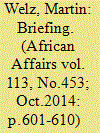

|
|
|
|
|
| Summary/Abstract |
ACADEMIC ANALYSES OF THE PROLONGED CRISIS in the Central African Republic (CAR) and the international response to it are rare. This masks the depth of the crisis. The most recent outbreak of conflict alone, following a coup d'état staged by the Séléka rebels in March 2013, left countless civilians dead,1 more than half a million people displaced, and over half of the 4.6 million population in immediate need of aid.2 Several regional and international organizations, including the African Union (AU), the Economic Community of Central African States (ECCAS), the European Union (EU), and the United Nations (UN), became involved in the process of crisis solution, with all of the organizations deploying troops to the CAR. Their efforts have thus far born limited results; fighting and human suffering continue.
|
|
|
|
|
|
|
|
|
|
|
|
|
|
|
|
| 2 |
ID:
158302
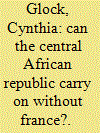

|
|
|
|
|
| Summary/Abstract |
The Central African Republic (CAR) has a long history of internal instability and conflict, which has usually been resolved through French military intervention. These issues resurface generally when political and economic difficulties re-emerge, creating a circle of conflict and intervention in which both countries have been involved for decades. Cynthia Glock takes stock of the current situation and its historical context, and asks how long the CAR and France will continue to be bound by this dynamic.
|
|
|
|
|
|
|
|
|
|
|
|
|
|
|
|
| 3 |
ID:
129615
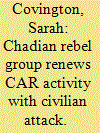

|
|
|
| 4 |
ID:
146998
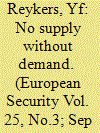

|
|
|
|
|
| Summary/Abstract |
Although the sad track record of the EU Battlegroups has attracted considerable scholarly attention, analyses have largely focused on obstacles related to the provision of the Battlegroup troops and to the consensus within the EU Council, hence taking a supply-side perspective. This article calls for complementing this perspective with an analysis of the demand for their deployment. That implies analysing whether and why the EU Battlegroups were (not) considered as an option by those actors taking the initiative to intervene in a particular crisis. Applying a rational-institutionalist approach, this article explains the absence of the Battlegroups from three recent crises: Libya (2011), Mali (2013) and the Central African Republic (2013–2014). Using data from document analysis and elite interviews, it shows that once a rapid military reaction became urgent, the EU Battlegroups were not even considered as an option by those initiating an international reaction.
|
|
|
|
|
|
|
|
|
|
|
|
|
|
|
|
| 5 |
ID:
137204
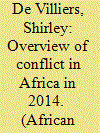

|
|
|
|
|
| Summary/Abstract |
Violent conflict escalated in Africa in 2014, with five sub-Saharan states – the Central African Republic (CAR), Nigeria, Somalia, South Sudan and Sudan – accounting for an estimated 75% of all conflict-related deaths on the continent. This paper provides an overview of the five major sub-Saharan African conflicts in 2014 and considers the underlying causes and dynamics in the Seleka/anti-Balaka conflict in the CAR, the Islamist threats of Boko Haram and al-Shabaab in Nigeria and Somalia, the civil war in South Sudan, and the long-running conflict between Sudan's government and southern and Darfuri rebels. The paper unpacks the general trends evident in these conflicts and the implications for the settlement thereof, including the targeting of civilians, ethnic and religious mobilisation and the state as epicentre of violence. The paper concludes with a brief look ahead to 2015.
|
|
|
|
|
|
|
|
|
|
|
|
|
|
|
|
| 6 |
ID:
139473
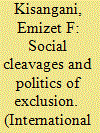

|
|
|
|
|
| Summary/Abstract |
The central African republic(CAR) became independent in August 1960.
|
|
|
|
|
|
|
|
|
|
|
|
|
|
|
|
| 7 |
ID:
137755
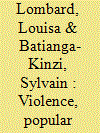

|
|
|
|
|
| Summary/Abstract |
People seeking to understand the scope and scale of violence in the Central African Republic over the past two years have cited a variety of social grievances centring on the political manipulation of religion, belonging, and access to opportunities. Without denying that these factors have played a role, this article argues that the violence must be understood in the context of social practices of violence that long predate the war, especially in light of the diffuse and non-centralized mode of organization through which the ongoing war has played out. The article focuses on the prevalence of popular punishment and vengeance, which have long histories as elements of statecraft in the CAR and have become even more widespread amid the generalized insecurity and anomie that have set in over the past few decades. The article presents evidence of the workings of popular punishment from the intra-family level to that of the crowd and quartier, in both rural and urban locales. Though people have important reservations about popular punishment, they also see vengeance as an important tool for enforcing a circumscribed mode of empathy and a minimum set of standards for social behaviour. These experiences in the CAR suggest that those wishing to understand how wartime mobilization happens must consider not just fighters' grievances but also people's conceptions of the practical and symbolic efficacy of vengeance and popular punishment as elements of politics and the management of threats.
|
|
|
|
|
|
|
|
|
|
|
|
|
|
|
|
|
|
|
|
|